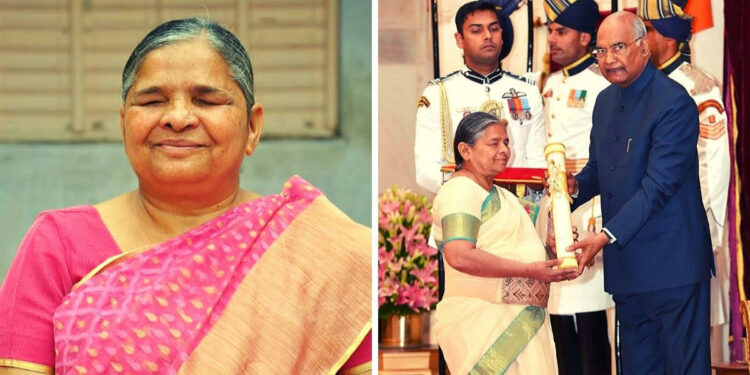“I worked for my daughters like every parent does. Why the award?” whispered Muktaben Dagli, evoking a chuckle from President Ramnath Kovind as they posed for the cameras. Amidst a thunderous applause, Dagli walked off the stage with India’s fourth highest civilian award — Padma Shri in March last year.
Padma Shri is the second national award that Dagli received after the Nari Shakti Puruskar in 2001 for her work towards empowering blind girls in Gujarat.
For nearly six decades, 66-year-old Muktaben Dagli has dedicated her life to shaping the future of over 200 blind girls. In addition, she has taken on the responsibility of caring for 30 individuals with disabilities and 25 elderly people who have been abandoned by their families.
A Tragic Incident That Ignited a Lifelong Mission
Born in Ankadiya Nana, a small village near Gujarat’s Amreli district, Muktaben Dagli lost her vision at the tender age of seven due to meningitis. Her parents saw little reason to educate a blind girl, but even as a child, Dagli knew that education was the key to a brighter future. She persuaded them to send her to Udyog Shala for the Blind in Bhavnagar district.
At 14, a heart-wrenching event changed her life forever. One of her closest friends did not return after the school vacations. The shocking truth soon emerged—her friend had been allegedly poisoned and burned by her own parents.
“My friend had often shared the cruelty she endured at home of being served leftover food, kept away from family and neighbours, and even forced to live in a shed with animals,” Dagli recalls with a heavy heart. “Her tragic fate shook me to my core. I grieved, but more than that, I felt a burning rage. That moment defined my purpose—to help blind girls who were seen as burdens by their families.”
With the unwavering support of her parents and friends, Dagli pursued her dream of establishing a safe haven for blind girls. She found a life partner who shared her vision, Pankaj Dagli.
“I never wanted children of my own because I had already devoted my life to my girls. I also valued my independence and freedom,” she says. “Finding Pankaj in the 1980s when marriage was everything for a woman was nothing short of a miracle. He became my greatest strength.”
The couple spent 12 years teaching at a blind school in Amreli before taking the leap to establish a residential school for blind girls in 1995. They started small adopting four blind girls and accommodating them in a relative’s one-bedroom flat in Surendranagar. By day, they taught; by night, they knocked on doors seeking donations.
After 13 years of tireless efforts and countless appeals for funds, their vision materialized into a five-acre campus. Today, the institution is much more than just a school it’s a sanctuary.
The campus houses a school for girls from classes 1 to 12, a guest house, a music school, a computer lab, a hostel, a conference room, a playground, and even dedicated spaces for abandoned senior citizens and disabled individuals. Blind college-going girls also find shelter here, with their accommodation and meals fully covered.

Beyond academics, the institution equips the girls with vocational training in home science, sewing, and computer skills. They are also trained in essential life skills like cooking, commuting, and documentation work, ensuring they lead independent lives.
“I was only two when my parents brought me to PMSK. Growing up here, I learned skills that I wouldn’t have at home. If today I am fearless and pursuing my dream of becoming a teacher, it is all because of Dagli ma’am,” says Bhoomi, a student currently pursuing Arts.
Many of the girls arrive as infants and stay until they complete their education. Some have been abandoned, while others have been brought by the police. For those who wish to marry after college, the organization helps them find suitable partners through a thorough background check. If a girl’s parents cannot afford the wedding, Dagli bears the entire cost.
Education is only part of the transformation. The school encourages participation in sports, cooking competitions, and cultural events. In a groundbreaking achievement, the institution has even formed its own women’s cricket team for the blind, which has won state-level matches.
For over two decades, Dagli has tirelessly worked to change lives, turning adversities into stepping stones.
“I have laughed, cried, felt both empowered and vulnerable. With every challenge, I have grown. No award or accolade can ever compare to the heartfelt gratitude of my daughters and their families,” she says with pride.
Muktaben Dagli’s journey is not just a story of resilience—it is an inspiration for generations to come.


















Discussion about this post